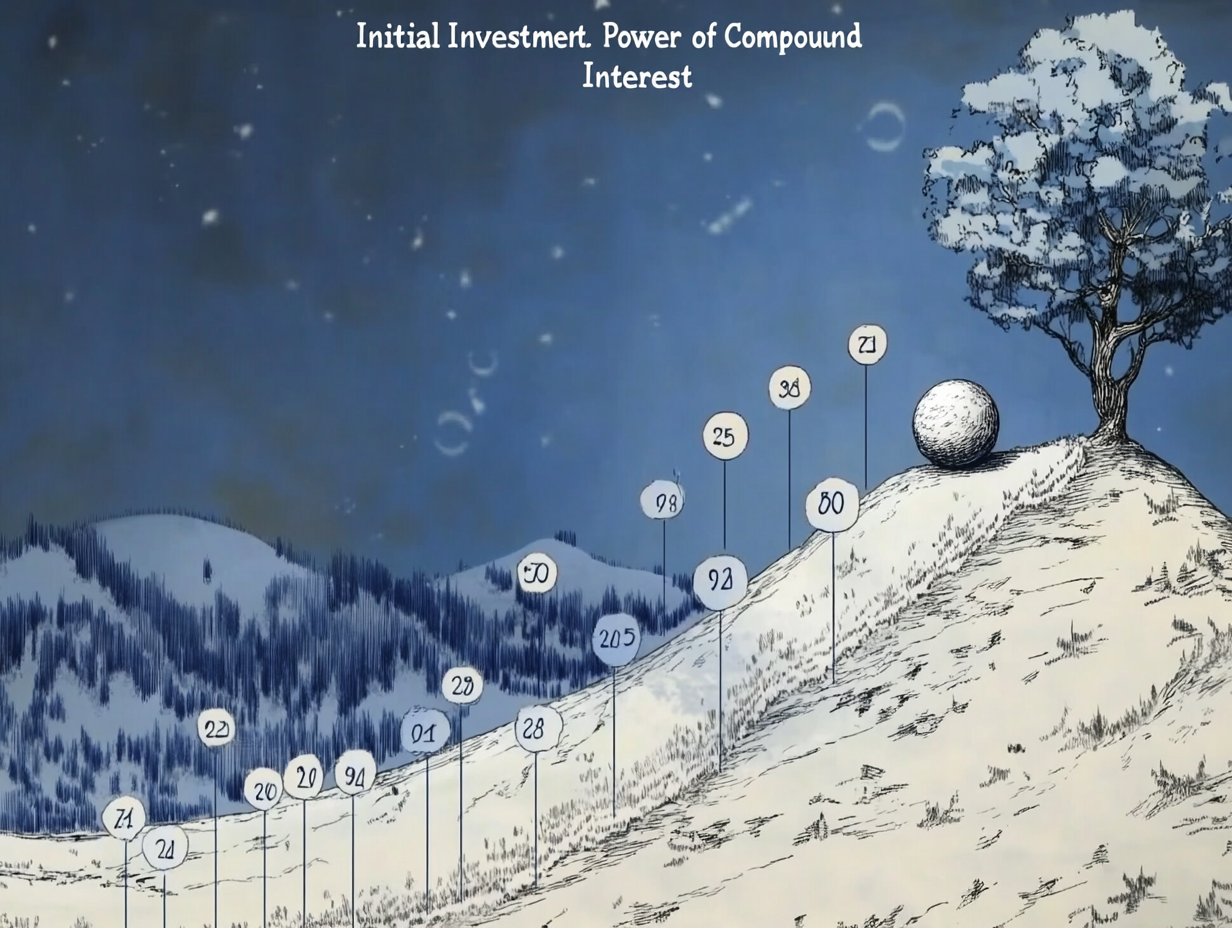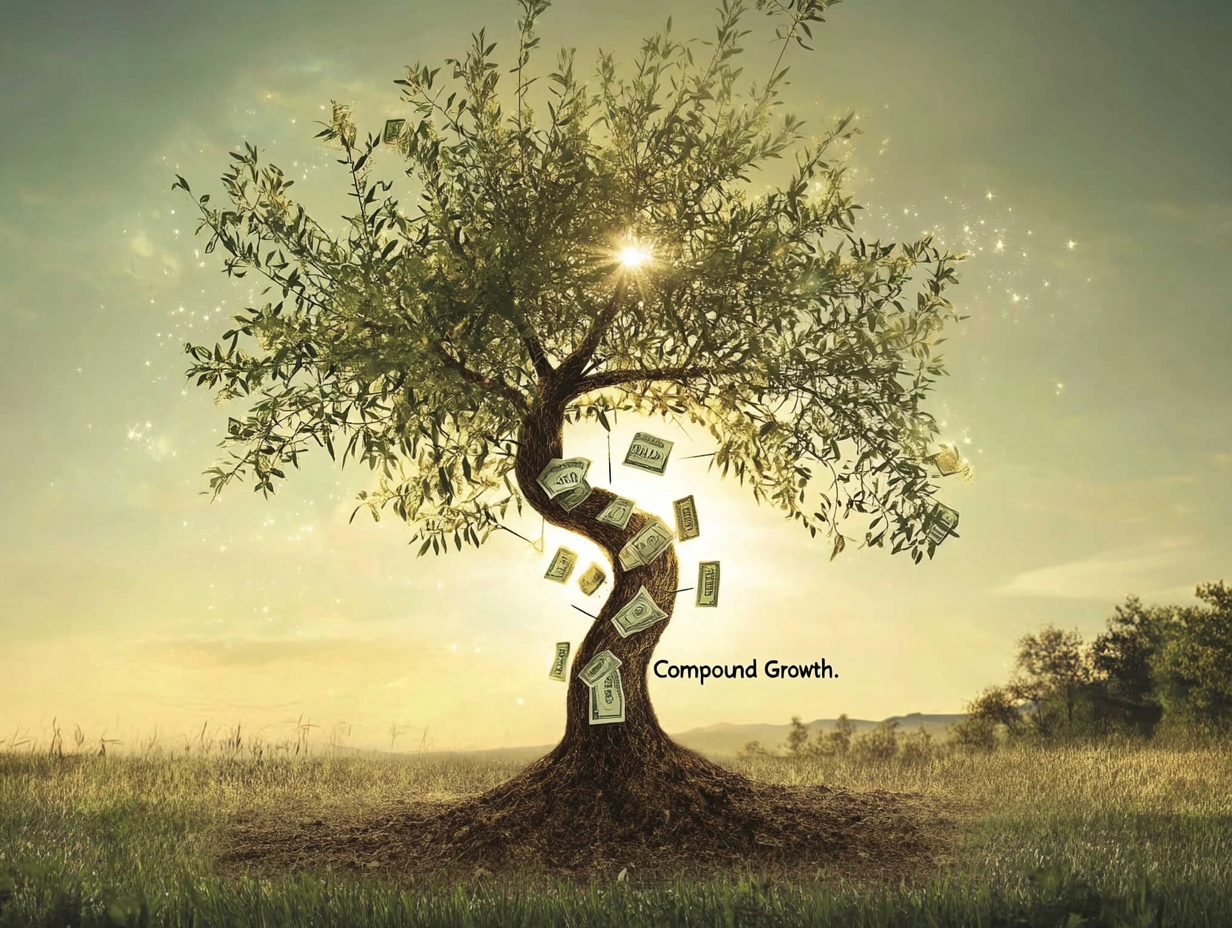The Power of Compound Interest: How Your Money Can Grow Exponentially Over Time

In the realm of personal finance and investing, few concepts are as powerful and transformative as compound interest. Often hailed as the "eighth wonder of the world" by Albert Einstein, compound interest is the secret sauce behind long-term wealth accumulation. It's the magic that allows your money to grow not just linearly, but exponentially, working tirelessly behind the scenes to multiply your initial investments over time. Understanding how compound interest works and harnessing its potential is crucial for anyone looking to build a secure and prosperous financial future. This guide will demystify this powerful principle and illustrate how you can leverage it to achieve your financial goals.
The Simple Yet Profound Mechanics of Compound Interest:
At its core, compound interest is earning "interest on interest." Here's how it works:
- Initial Investment (Principal): You start by investing a certain amount of money, known as the principal.
- Earn Interest: Over a specific period (e.g., annually), your investment earns interest based on the stated interest rate.
- Reinvesting Earnings: Instead of withdrawing the earned interest, it's added back to your principal.
- Interest on the New Total: In the next period, you earn interest not only on your original principal but also on the accumulated interest from previous periods.
This cycle repeats, and as your principal grows with reinvested earnings, the amount of interest you earn in each subsequent period also increases. This snowball effect is what leads to exponential growth over time.
The Difference Between Simple and Compound Interest:
To truly appreciate the power of compounding, it's helpful to compare it to simple interest:
- Simple Interest: Interest is calculated only on the original principal amount. The interest earned each period remains the same.
- Compound Interest: Interest is calculated on the original principal and any accumulated interest from previous periods. The interest earned increases over time.
Imagine you invest $1,000 at a 7% annual interest rate for 20 years:
- Simple Interest: You would earn $70 in interest each year ($1,000 x 0.07). Over 20 years, your total interest earned would be $1,400 ($70 x 20), and your total amount would be $2,400 ($1,000 + $1,400).
- Compound Interest: In the first year, you earn $70. In the second year, you earn 7% on $1,070 ($74.90). This continues, and by the end of 20 years, your total amount would be approximately $3,869.68.
As you can see, the difference is substantial – the magic of compounding adds an extra $1,469.68 in this example!
The Key Factors Influencing Compound Interest:
The rate at which your money grows through compounding depends on three main factors:
- Principal (Initial Investment): The larger your initial investment, the more you have working for you from the start.
- Interest Rate (Rate of Return): A higher interest rate or rate of return will lead to faster growth. Even small differences in interest rates can have a significant impact over the long term.
- Time (Investment Horizon): Time is arguably the most crucial factor. The longer your money is invested and allowed to compound, the more significant the exponential growth becomes.
The Importance of Starting Early: Time is Your Greatest Ally:
The example above highlights a critical takeaway: the earlier you start investing, the more time your money has to compound. Even if you start with a smaller amount, the years of compounding can lead to impressive results. Consider two individuals:
- Investor A: Starts investing $200 per month at age 25 and continues until age 65 (40 years). Assuming an average annual return of 7%, they would accumulate approximately $480,000.
- Investor B: Starts investing $400 per month at age 45 and continues until age 65 (20 years). Assuming the same 7% average annual return, they would accumulate approximately $206,000.
Investor A, who started 20 years earlier with half the monthly investment, ends up with significantly more money due to the power of compounding over a longer period.
Where Can You Benefit from Compound Interest?
Compound interest isn't just limited to investment accounts. It plays a role in various financial instruments:
- Savings Accounts: High-yield savings accounts offer compound interest, allowing your cash savings to grow gradually.
- Certificates of Deposit (CDs): These typically offer fixed interest rates that compound over a specific term.
- Retirement Accounts (401(k)s, IRAs): The returns generated within these accounts also compound over time, making them powerful tools for long-term retirement savings.
- Stocks and Bonds: The returns from capital appreciation and reinvested dividends or interest payments contribute to compounding growth.
The Flip Side: Compounding Debt:
It's important to be aware that compound interest also works against you when it comes to debt, especially high-interest debt like credit cards. If you only make minimum payments, the unpaid interest is added to your balance, and you start accruing interest on that larger amount. This can lead to a vicious cycle of debt that grows exponentially.
Harnessing the Power of Compounding for Your Future:
To make compound interest work for you, focus on these key principles:
- Start Early: The sooner you begin investing, the more time your money has to grow.
- Invest Consistently: Regular contributions, even small ones, can significantly boost your long-term returns.
- Reinvest Earnings: When possible, reinvest any dividends or interest earned to accelerate the compounding process.
- Be Patient: Compound interest is a long-term game. Avoid the temptation to withdraw funds prematurely.
Minimize Debt: Avoid high-interest debt to prevent the negative effects of compounding.

Conclusion:
Compound interest is a fundamental principle that can dramatically impact your financial future. By understanding its mechanics and harnessing its power through early and consistent investing, you can unlock the potential for exponential wealth growth over time. Make time your ally, let your money work for you, and watch the magic of compounding transform your financial landscape.



